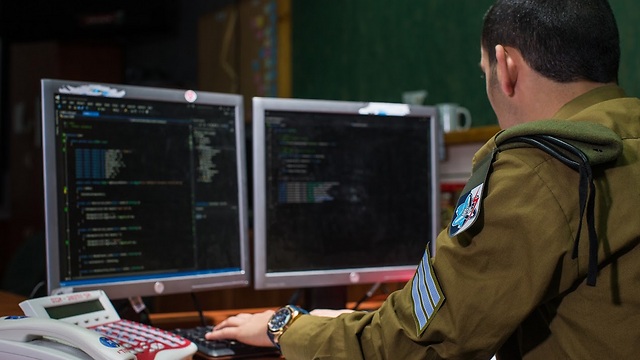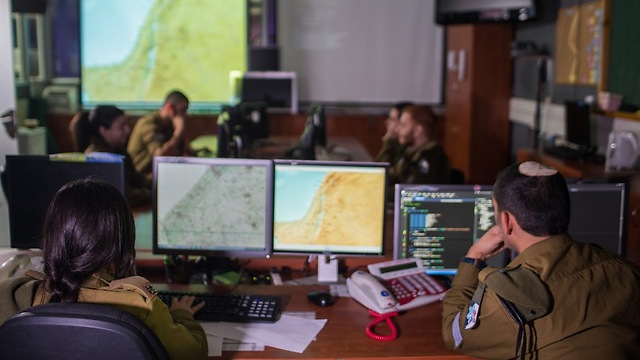http://www.ynetnews.com/articles/0,7340,L-4768429,00.html
When I posted a simmilar article this was the point that stood out to me that disabled people are being helped to develop through this program. That will save so many people time and money helping these people out
Pvt. E never thought he'd join the army. As someone on the autism spectrum, he struggled with certain social situations and would get easily distracted. Now, at 19, he is serving in a sensitive intelligence unit in the Israeli military, working in software quality assurance and defying what he and many of those around him thought he could accomplish.
Israel has for decades exempted people on the spectrum from joining the military, a compulsory duty for most Israeli Jews. But in recent years it is increasingly enlisting them, harnessing their special capabilities for certain meticulous tasks and including them in an Israeli rite of passage that can boost their independence and open professional doors.
"It gives me a chance. It gives me education, on-the-job education," said Pvt. E, whose name could not be published and whose face could not be photographed because he serves in a classified intelligence unit. "It's a beginning. It's a very solid beginning."
 The IDF has developed into a more inclusive military. (Archive photo: IDF Spokesperson)
The IDF has developed into a more inclusive military. (Archive photo: IDF Spokesperson)
Pvt. E. is part of a program called Roim Rachok, or "seeing into the distance," which provides training and assistance to Israelis on the autism spectrum who wish to enlist in the military. The program's founders saw the inclusion of people on the spectrum as a way to help usher them into a self-sufficient life once they are discharged.
Until recently, people on the spectrum were largely sidelined from the military, allowed to volunteer but without a proper framework to ease them into the challenges of military life. Roim Rachok, and at least one other program that has sprouted up, is doing just that.
The Israeli military serves as a great equalizer where youth from all walks intersect and those who do not enlist can find themselves at a handicap once they hit the job market. One's military career can often be a key determinant for employers and soldiers who served in intelligence units often land coveted jobs in Israel's booming tech sector.
People on the spectrum are dealt another challenge once they reach 21, the age when state-funded programs and assistance are mostly cut off, leaving them to fend for themselves or depend on their parents for support. Roim Rachok hopes to provide its graduates with a softer landing through inclusion in the military.
"Many sit at their parents' home and don't do anything. That is the painful reality," said Tal Vardi, a retired security official who is co-founder of the program. "This program gives every adult on the spectrum the opportunity to realize his full potential. And the moment we give them opportunity it puts them and us as a society in a different place."
Dozens of people on the spectrum have participated in the program since 2013. They undergo a three-month training session at the Ono Academic College outside Tel Aviv that tests their skills and determines whether they could handle the military's rigid nature. They then serve in a civilian capacity in a military unit for another three months before they officially enlist.
The program seizes on the participants' perceptive capabilities and their knack for precision or repetition and places them in the military's most elite and sensitive intelligence units, where they pour over satellite imagery or, like Pvt. E., serve in quality assurance roles, verifying that the software the military develops is flawless. The program is expanding to address people with skills other than heightened perception, training soldiers for roles in combat support as well.
 Some autistic soldiers serve in highly sensitive IDF intelligence units. (Archive photo: IDF Spokesperson)
Some autistic soldiers serve in highly sensitive IDF intelligence units. (Archive photo: IDF Spokesperson)
Once in the army, the soldiers are accompanied by an occupational therapist and a psychologist, lending support both to the people on the spectrum and their commanders and colleagues who may need guidance in their relationship with the soldiers.
Unlike typical recruits, who serve close to three years, these soldiers have a basic, voluntary, service of one year. But they are allowed to extend their service and volunteer for an additional two years if they choose. Roim Rachok also provides guidance once they leave the military.
Autism is a developmental disorder that can involve language and social impairments, affecting people to varying degrees. Many of the participants in Roim Rachom are considered "high functioning," meaning they have above-average intelligence but may have difficulties with social interaction and communication.
Not all soldiers on the spectrum qualify for the program and of those who do, not all have gone on to serve in the military, Vardi said. He said that much of the soldiers' success depends on how tolerant and accepting the people they work with can be, which is why support staff are deployed to help.
"Often the operational difficulty brings with it some sort of emotional difficulty," said Capt. Y., who commands six soldiers who are on the spectrum. "There may be a soldier who really struggles with the work and he isn't succeeding and you need to know how to deal with it."
In the small office in downtown Tel Aviv where Pvt. E. and his fellow soldiers are based, they toil away on computers beneath pulled blinds, shielding their classified work from prying eyes outside. A corkboard spelling out the day's to-do list hangs on the wall beside a whiteboard, where the soldiers draw up mathematical equations during their spare time.
"It's revolutionary," said Pvt. Y., a soldier who also works in quality assurance, of his military service. "It proves that even though others say we cannot, we can."


No comments:
Post a Comment